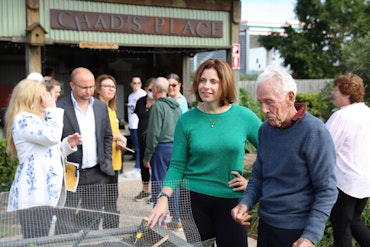National medicine safety project for aged care receives $1.5m in funding
The Pharmacists Actioning Rational use of Medicines in Aged Care (PHARMA-Care) quality monitoring project has received $1.5m dollars in funding to develop, test and assess the costs of a nationally scalable data system for medicine quality and safety in aged care homes.

(Source: Shutterstock)
The Pharmacists Actioning Rational use of Medicines in Aged Care (PHARMA-Care) quality monitoring project has received $1.5m dollars in funding to develop, test and assess the costs of a nationally scalable data system for medicine quality and safety in aged care homes.
The PHARMA-Care quality monitoring project will let care providers, consumers and policy makers have access to important data on the safety in aged care homes and medicine use.
The project is in line with the Aged Care Quality and Safety Royal Commission recommendation to add new care models in residential facilities which include pharmacists to improve the use of medicines and a four-year $345m dollar national onsite pharmacist program, beginning in 2023.
PHARMA-Care will be a collaborative project led by UniSA Enterprise Fellow and pharmacist Dr Janet Sluggett, which will use routinely collected data to provide an ongoing overview of medicines use and safety in aged care homes.
Dr Sluggett said the project will build a national framework to regularly evaluate quality use of medicines and pharmacist activities across residential facilities.
“We’ll provide a baseline evaluation to inform aged care policy and planning, and to help pharmacists and aged care teams to see what is working well and identify if improvements in medicines use are possible,” said Dr Sluggett.
“Proactive action based on these project insights will help to reduce unintended harm from medicines and ultimately support resident health and wellbeing.”
The project will be carried out as a partnership between the South Australian Health and Medical Research Institute, Flinders University, University of Tasmania, Macquarie University, Curtin University, professional societies, clinicians, consumers and Eldercare.
The PHARMA-Care project will also involve working together with the Registry of Senior Australians, Medi-Map and Ward Medication Management.
The project is funded by the Medical Research Future Fund Preventive and Public Health Research Initiative: 2022 Quality, Safety and Effectiveness of Medicine Use and Medicine Intervention by Pharmacists Grant.
Research has previously found that clinical pharmacy services available in nursing homes and hostel settings were able to reduce the use of benzodiazepines, laxatives, non-steroidal anti-inflammatory drugs and antacids, along with errors in dose administration, with the potential to save costs for the healthcare system.























Comments